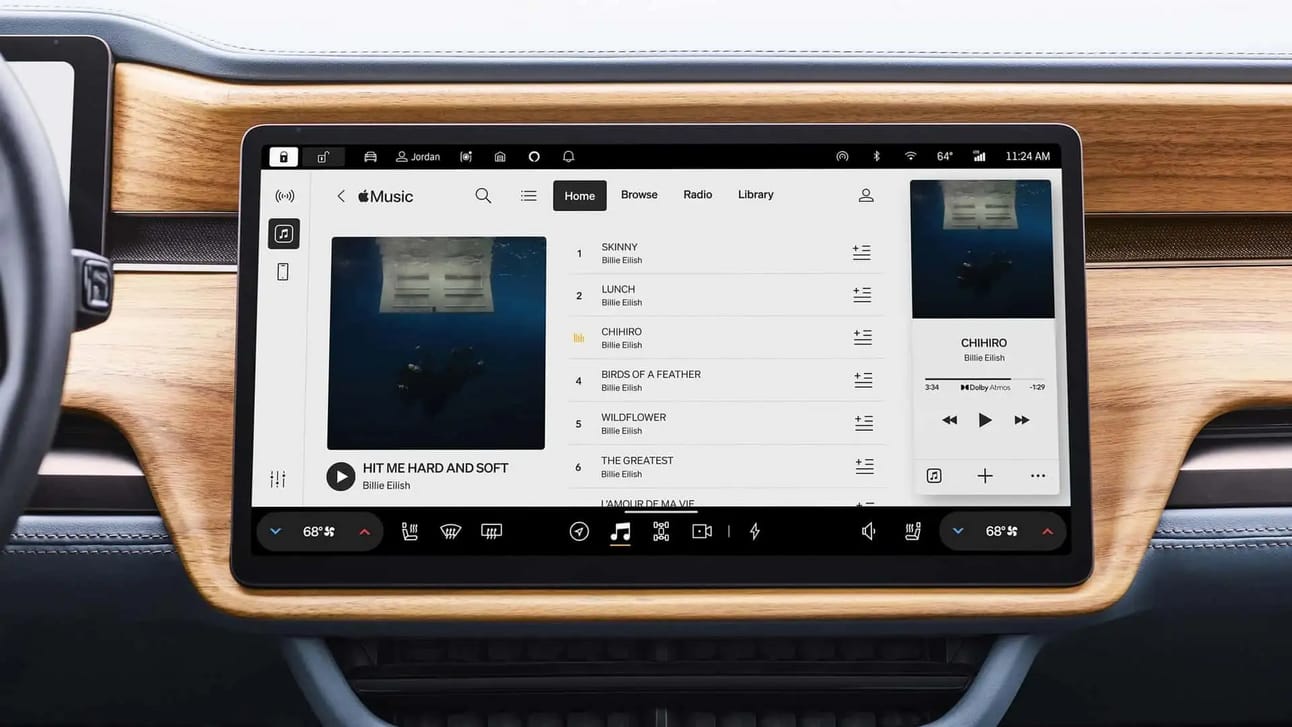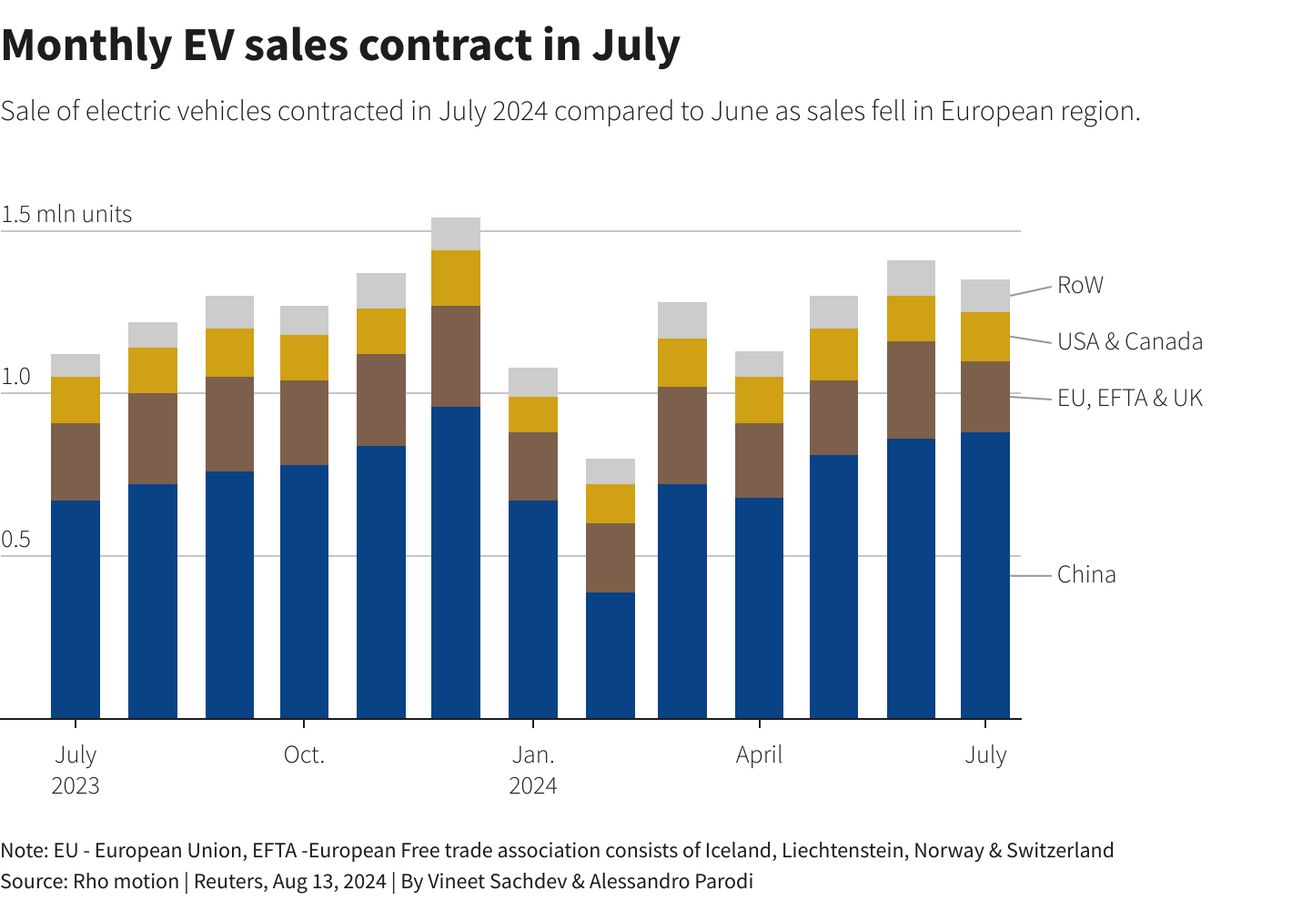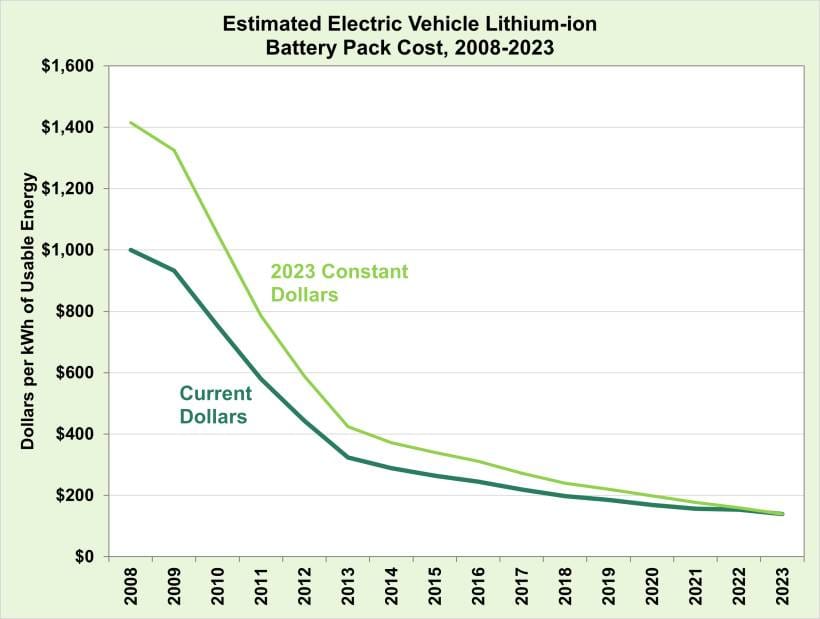
The key points:
Rivian is one of the few OEMs (Tesla, Lucid, GM) that are not offering CarPlay in it's vehicles
Rivian has introduced a new service called Connect+ which adds many streaming capabilities to the infotainment. Apple Music, Dolby Spatial Audio, Audible
The main addition is Apple Music. Other OEMs like Porsche and Mercedes Benz also have this. But the kicker is that Rivian has developed this together with Apple. This to me suggests that Apple has probably faced some backlash of it earlier strategy to take over the infotainment from OEMs. As expected OEMs are not that keen on this strategy.
In the new strategy, if Apple works together with OEMs to better integrate their services into infotainments, it is win-win for everyone. Better experience for users, better product for the OEM and Apple can still maintain it's presence in vehicle with or without CarPlay.
Trend: The modern car infotainment thrives on streaming capabilities.
P.S. Recently, Rivian appointed Google Veteran Sangsoo S. as VP of Infotainment Software (Link)
VW Trinity Delay and Rivian to the rescue? (Link)
Summary
Once considered Volkswagen’s savior, the Trinity EV was expected to help close the gap with Tesla. After scrapping plans to build a new $2.2B factory to produce the model in 2022, VW’s flagship EV looks to be even further away.
VW’s Trinity was supposed to launch in 2026, but the timeline has been pushed back several times. It was expected in 2028, then 2030, and now it looks like closer toward the end of 2032, Handelsblatt learned from company insiders.
My take:
VW SW troubles seems to be the defining aspect and I would go as far as to say this it will be a make or break for the OEM
Pushing a new EV line by 8 years is not what one of the largest automaker conglomerate can easily recover from
The whole point of such common platforms is to achieve economies of scale by making more of the same components across brands and models.
Seeing such news one after the other from VW and other OEMs, I beg to ask the question did the project cost actually make up for the economies of scale that was promised with SW
GM shifting it's China Strategy (Link)
Key points
GM is reducing it's presence and man-power in its China Operations
Unlike in previous years GM is facing intense competition from Chinese OEMs.
Its joint venture with SAIC is expiring on 2027.
The joint venture based vehicles could be at a massive disadvantage compared to other Chinese built vehicles. And this could be on purpose to drive down the revenue of the foreign brands in China. Could this be part of the larger movement that Chinese OEMs are driving out foreign brands out of China.
Summary
General Motors (GM) has begun laying off staff in China and is planning a significant structural overhaul of its operations in collaboration with its local partner, SAIC. This move comes as GM recognizes that its sales in China are unlikely to return to their 2017 peak levels. The layoffs are affecting departments related to the Chinese market, including research and development. In the coming weeks, GM and SAIC will discuss potential capacity cuts as part of a strategic shift focusing on electric vehicles (EVs) and premium models.
This strategy represents a major change for GM, which once generated significant profits in China but is now facing intense competition from local brands in an oversaturated market. GM plans to continue producing lower-cost vehicles and EVs in its joint venture with SAIC Motor Corp. and Wuling Motors, some of which will be exported from China. However, there are concerns about the profitability of GM's operations in China, as the company reported a $104 million loss in the region during the most recent quarter.
GM's partnership with SAIC, which manufactures Buick, Cadillac, and Chevrolet vehicles, is set to expire in 2027, and the automaker is aiming to return to sustained profitability before then. In contrast, GM's partnership with SAIC-GM-Wuling, which focuses on affordable compact EVs, has shown better sales resilience. GM's sales in China have sharply declined, with a 29% drop in the latest quarter, highlighting the challenges the company faces in the world's largest car market.
Zeekr Fast charging (Link)
My take:
There was a moment in the smartphone world that shifted the development roadmap of all manufacturers: The introduction of fast charging.
Before fast-charging, the only way to improve the product was to increase the battery size which meant the phones "had" to get better each year, especially with more powerful chips.
But after fast charging manufacturers could deliberately prioritize for factor and go with a smaller physical footprint and battery to improve the overall product experience. And form a consumer point of view, charging the phone to 80% was only 15-20 minutes.
Of course, this is not the same for cars. But I can bet that human nature would still work the same way. If we have the possibility to charge vehicles in such a short time, OEMs would begin to optimize it for other factors such as overall vehicle handling, cost etc. and not just max out the range in order to address the range anxiety that prospective EV buyer might have.
Summary
Chinese car maker Zeekr has announced that its new electric vehicle (EV) batteries can charge faster than those of industry leaders Tesla and BYD. Zeekr claims that its upgraded batteries can charge from 10% to 80% capacity in just 10.5 minutes using its ultra-fast charging stations. In comparison, Tesla's Model 3 can cover 175 miles with a 15-minute charge, which is slightly less than half of the car’s full range. The first vehicle to feature Zeekr's new battery, the 2025 007 sedan, will be available starting next week.
The company also highlighted that its battery performs well in cold weather, charging from 10% to 80% capacity in under 30 minutes at temperatures as low as -10°C. Industry experts believe these claims are credible and see them as a significant leap for Zeekr in the highly competitive Chinese EV market, where companies like BYD prioritize scale and sales, while brands like Zeekr focus on enhancing the charging experience. Zeekr's parent company, Geely, which owns several other brands including Lotus and Volvo, has the resources to support such innovations.
EV Vehicle Sales July (Link)

Texas sues GM, saying it tricked customers into sharing driving data sold to insurers (Link)
Summary
Texas filed a lawsuit Tuesday against GM over years of alleged abuse of customers' data and trust. New car owners were presented with a "confusing and highly misleading" process that was implied to be for their safety, but "was no more than a deceptively designed sales flow" that surrendered their data for GM to sell. The suit contends that at no point was selling driving data ever even suggested as a possibility, putting GM in violation of the state's consumer protection laws.
Dropping EV Battery Cost (Link)

Dramatic Price Reduction: The cost of lithium-ion battery packs for light-duty EVs has plummeted by 90% over the past 15 years, with an average price of $139/kWh in 2023, compared to $1,415/kWh in 2008 (inflation-adjusted).
Contributing Factors: This significant price drop is attributed to improvements in battery technology, enhanced manufacturing processes, and higher production volumes.
Recent Price Movements: Battery prices have seen fluctuations, including a 14% decrease in 2023 following a price increase in 2022 due to supply chain disruptions from the pandemic.
Challenges with Tesla's 4680 Cells: Tesla’s large-format 4680 cells have not yet delivered the expected cost reductions, with current production expenses remaining higher than those of cells sourced from suppliers.
Future Projections: Battery costs are anticipated to decrease further, with Goldman Sachs forecasting a 40% reduction by 2025, which could enable EVs to achieve cost parity with gasoline vehicles as early as 2024 in some markets.
Polestar US Production (Link)
Summary
Polestar, the Swedish electric vehicle maker, has begun production of its Polestar 3 SUV in the United States at Volvo's plant in South Carolina. This move helps Polestar avoid steep tariffs imposed on Chinese-made cars. Deliveries of the Polestar 3 from this U.S. plant will begin next month for American customers, followed by deliveries to Europe. Polestar, majority-owned by China's Geely, has been manufacturing vehicles in China but is now expanding production to avoid tariff-related costs.
